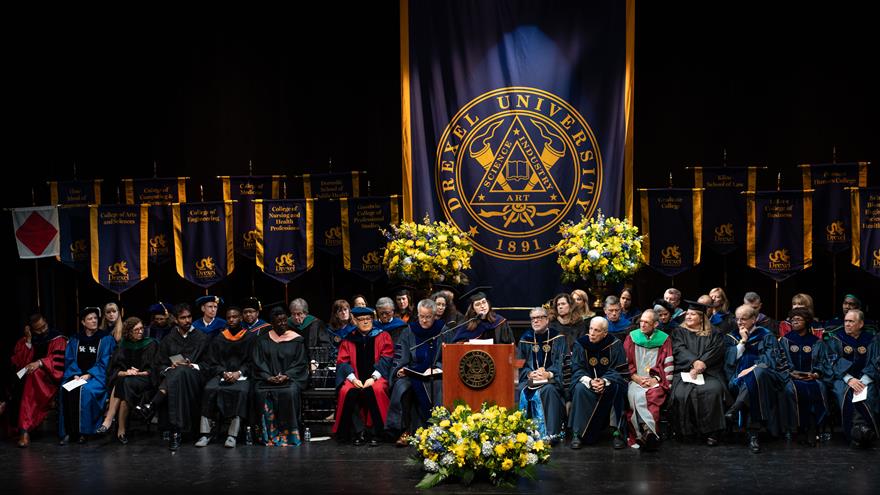Drexel Experts Available to Comment on 50th Anniversary of March on Washington
August 15, 2013
Related

- Convocation 2023: Personal Stories of Impact “Only Possible at Drexel”
- Justice of the Supreme Court of New Jersey to Keynote Kline Law Commencement
- Drexel University Professors Reflect on Potential of AI
- Drexel’s Kline School of Law Receives Gift to Advance Diversity and Inclusion in the Legal Profession
On August 28, citizens from across the country will converge on our nation’s capital to commemorate the 50th anniversary of the historic March on Washington for Jobs and Freedom. President Obama will honor the anniversary of the famous civil rights march by speaking from the steps of the Lincoln Memorial, the same place that Rev. Martin Luther King, Jr. delivered his “I Have a Dream” speech.
Experts at Drexel University in Philadelphia are available to assist the news media with their coverage of the event and its implications from a variety of perspectives:
- Race, Policing and Social Movements: Dr. George Ciccariello-Maher, an assistant professor of political science, teaches and writes about social movements, race, prisons and policing. He researches race in the United States and internationally, including how race is associated with suspicion and guilt.
“Any commemorations of the Civil Rights Movement this year will refer inevitably to Trayvon Martin as the symbol of unfulfilled demands for justice. However, if the movements developing around Martin's death are tied too tightly to the Civil Rights old guard, they are not likely to take off in a powerful way. These movements will only take off if they do so on their own merits, by developing organic young leadership that is not beholden to political or party interests, and which recognizes a fundamental truth of the Civil Rights Movement: that their strength lies more in the streets than in the halls of power." - Political Communication and its Impact on Society: Dr. William L. Rosenberg is a professor of political science and director of the Drexel University Survey Research Center. He is an expert on political communications and public opinion. He is interested in how political messages, often related to race, social justice and politics are communicated to various publics and the impact of these communications on society in terms of election campaigns and political movements.
“The March on Washington provided one of the most significant series of political speeches regarding individual rights in United States history. The March had enormous impact because it communicated the importance of civil rights, not only to the audience present that day, but to those who watched and read about it at the time, and those who continue to hearken back to the historic events of that day. After 50 years, it continues to be viewed as an event that resonates domestically and internationally in terms of civil and human rights.”
Dr. King's dream for racial and economic progress remains just that: a dream.
- Civil Rights: Dr. Donald Tibbs, associate professor of law, focuses on the overlapping issues of race, law, civil rights and criminal procedure. He is the author of From Black Power to Prison Power: The Making of Jones v. North Carolina Prisoners' Labor Union (Palgrave MacMillan, 2012).
“The 50th Anniversary of the 1963 March on Washington stands as a moment to reckon our past with our present and future. Recalling that Dr. King explained ‘the Dream’ of racial equality, tolerance and inclusiveness remains a centerpiece for our discussions. But, our recognition of Dr. King's shining moment in the Civil Rights era, should give us pause to reflect on the post-Civil Rights era. The shooting death of Trayvon Martin, the exposure of the NYPD's racial profiling tactics, and our investment, state and private, in mass incarceration reveals that Dr. King's dream for racial and economic progress remains just that: a dream. Moving forward, however, our present social movements and spirited debate around America's racial, legal and social ills reminds us that the power of change remains with the people; and that is the true legacy of the 1963 March on Washington.” - Economic Inequities: Dr. Kevin Woodson is an assistant professor of law whose scholarship focuses on race and the legal profession and corporate culture. He is also interested in issues of civil rights law. Woodson received his doctorate in sociology from Princeton University, and his J.D. from Yale Law School.
“For most of American history, outright racial discrimination kept good jobs out of the reach of black Americans. Today, black Americans face a less blatant, but equally difficult set of structural problems. Addressing these daunting structural inequalities would require substantial education reform, changes in our country’s approach to drug addiction and the punishment of low-level drug offenders, and, perhaps, greater job training programs that might help provide some workers valuable skills.”
Drexel News is produced by
University Marketing and Communications.
now.editor@drexel.edu
For story suggestions or to share feedback
now.webmaster@drexel.edu
For questions concerning the website, or to report a technical problem